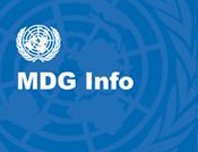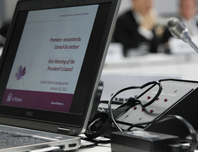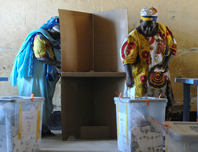DESA News
Volume 11, No.12 - December 2013
Capacity development
 UN DESA’s Statistics Division together with the United Nations Economic and Social Commission for Western Asia (UN ESCWA) is organizing a Training Workshop on SDMX tools for MDG Data Reporting on 2-5 December in Casablanca, Morocco.
UN DESA’s Statistics Division together with the United Nations Economic and Social Commission for Western Asia (UN ESCWA) is organizing a Training Workshop on SDMX tools for MDG Data Reporting on 2-5 December in Casablanca, Morocco.
Statistical Data and Metadata eXchange (SDMX) is the preferred standard for allowing National Statistical Offices (NSOs) to automate and standardize exchange of data and metadata associated with the Millennium Development Goals (MDGs).
The workshop will provide participants with an introduction to SDMX and focus on the process of mapping and exchanging indicators with SDMX through the features added to DevInfo 7.
Published by UN DESA’s Statistics Division, DevInfo is a powerful database system for monitoring human development. It is a tool for organizing, storing and presenting data in a uniform way to facilitate data sharing at the country level across government departments, UN agencies and development partners. DevInfo has features that produce tables, graphs and maps for inclusion in reports, presentations and advocacy materials.
For more information:
UN DESA’s Statistics Division
DevInfo 7
 UN DESA’s Statistics Division will conduct a Workshop on Census Evaluation, in collaboration with General Statistics Office of Viet Nam, in Hanoi, Viet Nam, on 2-6 December.
UN DESA’s Statistics Division will conduct a Workshop on Census Evaluation, in collaboration with General Statistics Office of Viet Nam, in Hanoi, Viet Nam, on 2-6 December.
The regional workshop will bring together some fifteen national statisticians from eight Asian countries. The main purpose of the workshop is to provide the staff of national statistical offices with hands-on training to master indirect demographic techniques necessary for the evaluation of census results.
Participants will learn, in particular, the methods to evaluate age-sex structure of population, fertility as well as mortality data obtained from national population and housing censuses. They are also expected to establish own professional networks through exchange of experiences and knowledge on census data analyses.
UN DESA’s Statistics Division is the primary agency responsible at the international level for (1) collecting official national demographic including statistics on population size and structure, fertility, mortality and international migration; (2) publishing internationally agreed standards and guidelines on collecting, compiling and disseminating demographic statistics and (3) providing technical assistance to national statistical offices on topics related to the improvement of demographic statistics.
The division also publishes the Demographic Yearbook which collects, compiles and disseminates official statistics on a wide range of topics. Data have been collected from national statistical authorities since 1948 through a set of questionnaires dispatched annually by UN DESA’s Statistics Division to over 230 national statistical offices.
For more information: UN DESA’s Statistics Division
 The National Capacity Building Workshop on Developing Capacity for e-Participation: Engaging Citizens in Development Policy and Decision-making Processes through Information Communication Technologies (ICTs) will take place in Baku, Azerbaijan on 3-5 December.
The National Capacity Building Workshop on Developing Capacity for e-Participation: Engaging Citizens in Development Policy and Decision-making Processes through Information Communication Technologies (ICTs) will take place in Baku, Azerbaijan on 3-5 December.
The event is organized by the Ministry of Communications and Information Technologies (MoCIT) of the Republic of Azerbaijan in cooperation with United Nations Development Program (UNDP) Country Office in Azerbaijan, Ministry of Economy and Industry of Azerbaijan and Civil Service Commission under the President of the Republic of Azerbaijan with substantive assistance of UN DESA’s Division for Public Administration and Development Management (DPADM).
The workshop will serve as an enabling platform of the World Summit for Information Society to enhance the knowledge of national practitioners and professionals in the current concepts, approaches, and practices in engaging citizens in the decision-making process in formulating and implementing national development plans including the use of ICTs. It is expected that the participants of the workshop will learn and share their experiences and exchange best practices in e-participation including aspects of regulatory and institutional frameworks in engaging citizens through e-participation in public policy and service delivery.
The workshop sessions will provide opportunities for participants to interact with speakers and resource persons in order to develop new capacities for designing and implementing successful e-participation strategies and policies for a more transparent, accountable and efficient government and citizen engagement and participation, as well as to create and strengthen networks of stakeholders and practitioners.
Approximately 40 government officials and professionals at mid to senior levels are expected to participate (e.g. advisors to government chief executives at national and regional levels; heads/deputy heads of departments/units, chief specialists/officers, etc.) representing Ministry of Communications and Information Technologies (MoCIT) of the Republic of Azerbaijan, Ministry of Economy and Industry of Azerbaijan and Civil Service Commission under the President of the Republic of Azerbaijan.
For more information: UN DESA’s Division for Public Administration and Development Management (DPADM)
 Seminars on Developing Programmes for the Implementation of the System of National Accounts 2008 (2008 SNA) and Supporting Statistics and the System of Environmental-Economic Accounting 2012 (2012 SEEA) and Supporting Statistics in Africa will be held in Kampala, Uganda on 9-13 December.
Seminars on Developing Programmes for the Implementation of the System of National Accounts 2008 (2008 SNA) and Supporting Statistics and the System of Environmental-Economic Accounting 2012 (2012 SEEA) and Supporting Statistics in Africa will be held in Kampala, Uganda on 9-13 December.
The seminars are organized by UN DESA’s Statistics Division, in collaboration with the United Nations Economic Commission for Africa, African Development Bank, East Africa Community, the Common Market for Eastern and Southern Africa (COMESA), the Economic Community Of West African States (ECOWAS), United Nations Environment Programme (UNEP), United Nations Development Programme (UNDP), the World Bank and the Uganda Bureau.
The SNA seminar is organized to assist participating African countries with initiating the formulation of a national strategy and implementation programme for the 2008 SNA and supporting socio-economic statistics with the objective of strengthening the national statistical system in support of improved policy making. It is expected that this initiative will lead to a multi-year statistical programme helping countries to change over to the 2008 SNA with a view to producing timely comparable national accounts statistics and short-term economic indicators which fully meets the user needs as well as complies with the international standards.
The objective of the SEEA seminar is to assist the participating African countries with developing an implementation strategy for the SEEA Central Framework on the basis of policy priorities and statistical development as well as to develop a sub-regional implementation strategy. It is expected that this initiative will lead to a multi-year statistical programme assisting countries in the adoption of the SEEA 2012 Central Framework with a view to produce timely comparable economic and environmental statistics based on selected environmental-economic accounts and environmental-economic indicators which fully meets the user needs as well as complies with the international standards.
The seminars brings together senior managers from national statistical offices and senior representatives from government agencies using economic and environmental information for policy setting from countries in Africa to discuss the development of a national implementation strategy for the 2008 SNA and the SEEA 2012 Central Framework. The aim is also to share experiences among countries in the region and facilitate cooperation amongst the neighbouring countries as well as north-south and triangular cooperation in support of the SNA and SEEA implementation strategy in Africa.
For more information:
UN DESA’s Statistics Division
 A capacity building workshop on “Innovation and Performance Evaluation in Africa’s Public Service: The Role of Human Resource Managers” will be organized in Addis Ababa, Ethiopia, on 11-13 December.
A capacity building workshop on “Innovation and Performance Evaluation in Africa’s Public Service: The Role of Human Resource Managers” will be organized in Addis Ababa, Ethiopia, on 11-13 December.
The event is arranged by UN DESA in partnership with the Africa Public Sector Human Resource Managers’ Network (APS-HRMnet) and the United Nations Economic Commission for Africa.
The main objective of the workshop is to exchange ideas and best practices and explore strategies for strengthening the role of human resource managers in promoting innovation and performance evaluation of the public service with the aim of building the capacity of the public service in Africa for efficient public service delivery.
Innovation is not an exclusive phenomenon that is happening only in the private sector. The public sector has also demonstrated capability to innovate in order to improve delivering public services. To validate that, one has just to look at the increasing rate of nominations to the United Nations Public Service Award each year which has gone up from 81 in 2003 to 601 in 2013.
However, most innovative practices so far nominated focus on improving service delivery in the areas including health, education and gender equality. Very few addresses the improvement of performance of the human resources that are delivering the services. While it is critical that the services delivered become better, it is also important that the capacities for innovation especially in terms of human resources are supported and improved.
For more information:
“Innovation and Performance Evaluation in Africa’s Public Service: The Role of Human Resource Managers”
 UN DESA’s Statistics Division together with the United Nations Economic and Social Commission for Western Asia (UN ESCWA) is organizing a Training Workshop on SDMX tools for MDG Data Reporting on 2-5 December in Casablanca, Morocco.
UN DESA’s Statistics Division together with the United Nations Economic and Social Commission for Western Asia (UN ESCWA) is organizing a Training Workshop on SDMX tools for MDG Data Reporting on 2-5 December in Casablanca, Morocco.



